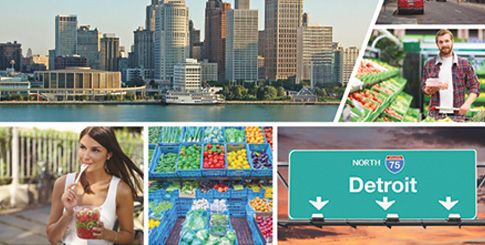The new tenant company plans to spend $1 million to renovate the space, with the help of an $800,000 grant awarded to Eastern Market’s corporate parent.
Michigan Farm to Freezer aims to be a perfect complement to the market’s other tenants, as the company takes in imperfect produce, processes the commodities, then flash freezes the product for sale to schools, stores, restaurants, hospitals, and foodbanks.
Steady & Climbing
Over the past year, Detroit wholesalers have been responding to the same trends as most other terminal market merchants: climbing demand for local product, greenhouse vegetables, organics, tropicals, and ethnic items.
But Detroit merchants have an ace in the hole for one of these categories, since they’re located just an hour away from North America’s top greenhouse producer, Leamington, Ontario, across the Detroit River.
Greenhouse veggies
Running hand-in-hand with the locally grown movement but rising to a higher level with year-round availability, greenhouse vegetables are booming in popularity.
“Greenhouse is a big part of the business and becoming larger,” Stone emphasizes. “It’s allowed people to say they’re getting a locally grown product, which is very true. If you get product from a greenhouse in Michigan or Ohio, that’s as local as you can get.” Of course, Leamington is nearby too.
Wholesalers on Detroit’s terminal markets handle an expanding range of greenhouse vegetables including peppers, cucumbers, tomatoes, zucchini, lettuces, and spinach. While some of these products come from Michigan greenhouses, the vast majority hail from Leamington. “Detroit is an easy market for Leamington to reach, and it’s almost like a homegrown product for us because it’s so close,” confirms Riggio.
“Greenhouse is great because it’s consistently good quality,” Stone comments. “You know what you’re going to get, and you know what your yield is going to be.”
Hydroponics gain ground
Recent years have witnessed the emergence of Detroit’s own ‘protected’ agriculture in the form of hydroponic growing operations. Green Collar Foods set up vertical growing racks in the Eastern Market’s Shed 5 back in 2015, and Artesian Farms began growing in the city’s Brightmoor district around the same time.



